There have been many music formats throughout the days, though few have had the staying power of CDs, Cassettes, and Vinyl Records. Sure we had the 4 track and 8 Track and laser disk, as well as beeswax tubes but many of these lived very short lives or at least commercially they did. I am sure there are still people that listen to every format that has been created along the way but when it comes to long-term commercial success, it’s really these 3. When doing some of the research for this article I found out that quite a few currently produced artists have music out on cassette. I honestly thought it was all but dead and only really hanging on from people still owning original ones. CDs and vinyl have never stopped being made since their inception, and as far as cassettes they may have been being made by a handful of artists but until recently they have not been in the mainstream for some time. So is there a winning format? Does one sound objectively and or subjectively better? We are going to break down each one and see if there is a definitive answer.

The Formats Through Time
Of the three formats that we are comparing, Vinyl came along the earliest and thus has been around the longest. Though not always at the top of physical sales it has managed to outlive any other format. Vinyl Records were first released in 1948 as the LP (Long Play) and spun at the familiar 33 1/3 RPM. A year later RCA released the 45RPM though they did not experience the same long-term success that the 33 did. Before either, there was the 78 RPM which were made of shellac and were fairly delicate comparatively to the vinyl.
Vinyl records dominated music sales for probably the longest time of any format, as it was not until 1962 that we saw the introduction of the Compact Cassette. While there were many formats released between the LP and the Compact Cassette (CC), many of them did not find themselves taking over music store selves. Some of the other formats released were for the Industry more than the Consumer anyways such mediums made for Radio.
20 years after the release of the CC, came the CD or Compact Disk. The precursor to which was the LaserDisc which actually was an analog format read by a laser released just 4 short years earlier. The LaserDisc was a 12inch verticle cut groove disc that was the first foray into using lasers to read music. LaserDisc while offering Audio only was actually made as a replacement for VHS tapes and really only did well in Japan. The Compact Disc was designed to hold audio only in a lossless format, PCM. The CD did not initially take off as well early on as portability was still an issue until anti-skip enabled devices came around and got better.
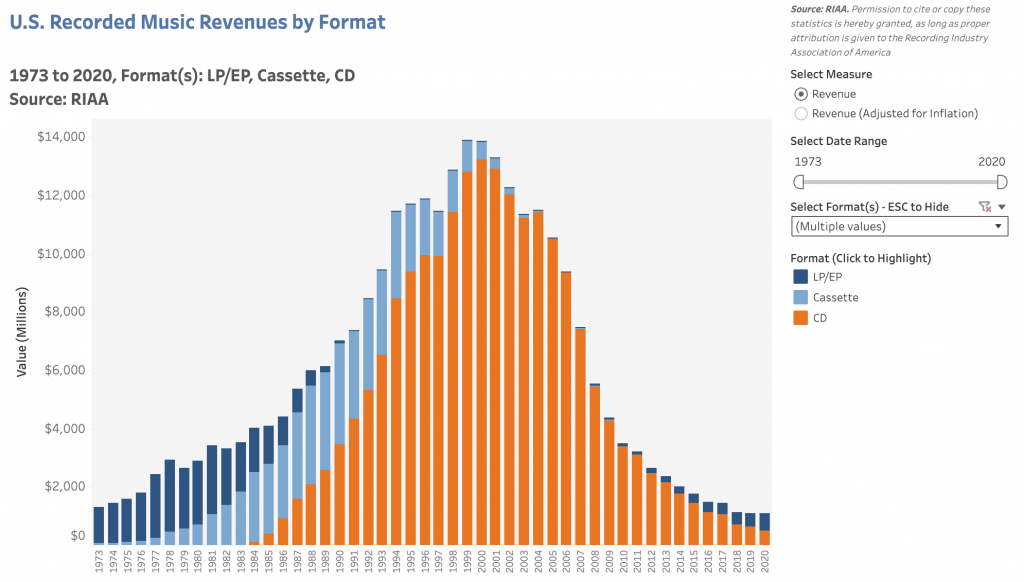
As we see in the market share image above CD’s make up for the majority of the actual sales value of the three. But of course, the advent of digital downloads in the mid 2000’s tanked all physical format sales. Below is a snapshot of all sales, including streaming.
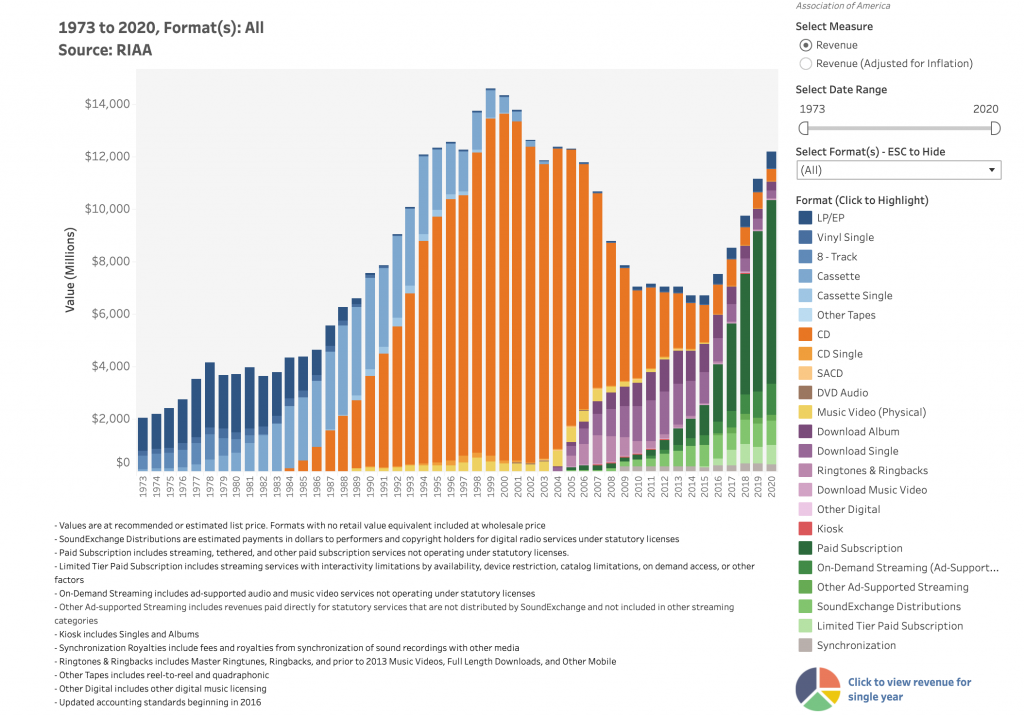
Aside from sources such as iTunes, most of the digital formats did not let you actually own the music, you essentially just borrowed it, and once you stopped your subscription the music was gone. There was also the infamous Napster and LimeWire, which allowed anyone to pirate just about any music in the world, and outside of the law, you did own the music at least physically if burned to a disc. Of course, while there were some options that were not nearly as popular most all of the downloading services only offered the lossy MP3 format. Now with more and more demand for Hi-Res digital audio, we have many more download services that offer DSD, Flac, and others, most of which that I know of are legitimate.
Sound Quality
Chances are if you are on Hifi Chicken, you care about sound quality. I know for me it is paramount, and I will always want the best quality I can have. Sound quality can be as objective as it is subjective. What I think sounds best may not align with what you or any measurement device says. All that said we can usually assume that regardless of preference starting with the most amount of data will always be best, as well as having the highest dynamic range, and the least amount of noise. If you like to add a bit of bass or treble in EQ, it has to exist first. Adding +5DB to nothing is still +5DB of nothing.
I recorded the same song, Higher Ground by the Red Hot Chili Peppers from all three physical formats. To set up the experiment I used Audacity to record the Line Out of my CD Player, Turntable, and Cassette Deck straight into my Macbook. There are some caveats to take with this,
1. We really do not have a way to equalize the playback quality of the devices themselves
2. All the devices used are in similar pricepoints, or at least for their time
3. There may be better ways to test the actual quality, this is the best way I could come up with
I did not want to use any processor or preamp as different inputs or circuits just add to the chain of possible variables that I could not account for in the recording.
Equipment used
Rotel CD11 Tribute ~$600
Audio Technica LP7 with Ortofon Red ~$900
Akai CS-F11 ~($250 in 1981, $741 today)
MacBook Pro running Audacity
USB Microphone interface
Audioquest Forrest RCA -> TRRS
I recorded the Wave Form in Audacity as this would give us the best look at what these formats look like in the same raw form. Basically, a WaveForm lets us “see” music.
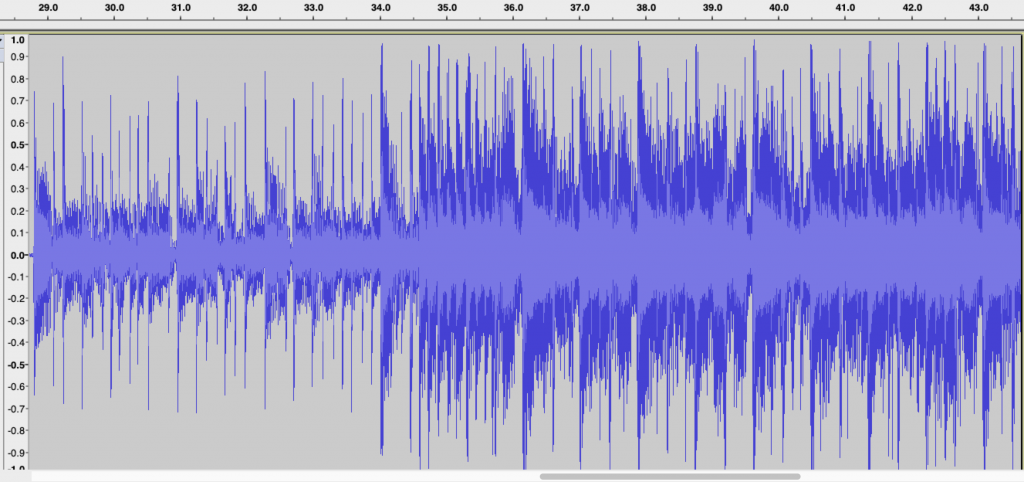

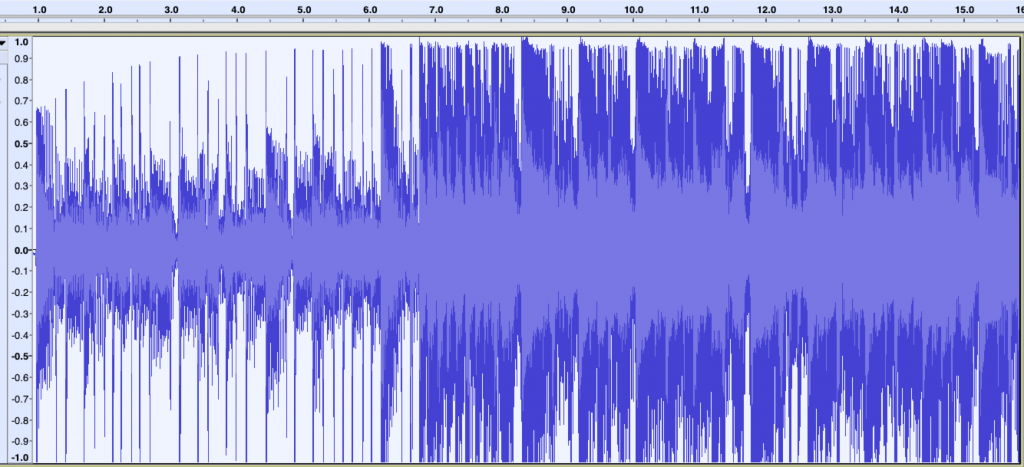
What do these recordings tell us? Well, here we can look at the dynamic range of the format as well as the loudness. CD seems to have the overall loudest playback and the lowest in the cassette. Cassette also doesn’t seem to reach as much between quiet and loud spots in the music, while vinyl seems here to have offered the best dynamic range. The possible Dynamic Range that can be had on each format is somewhat theoretical based on perfect conditions. Tapes come in at 50-70 DB of DR, Vinyl is around 70DB and CD comes in at 90DB of range. Perfect Diamond LPs can have as high as 110DB of Dynamic Range, though this is really not practical at the end listener case. We can see the similarity in Cassettes and LPs dynamic range in the recordings above.
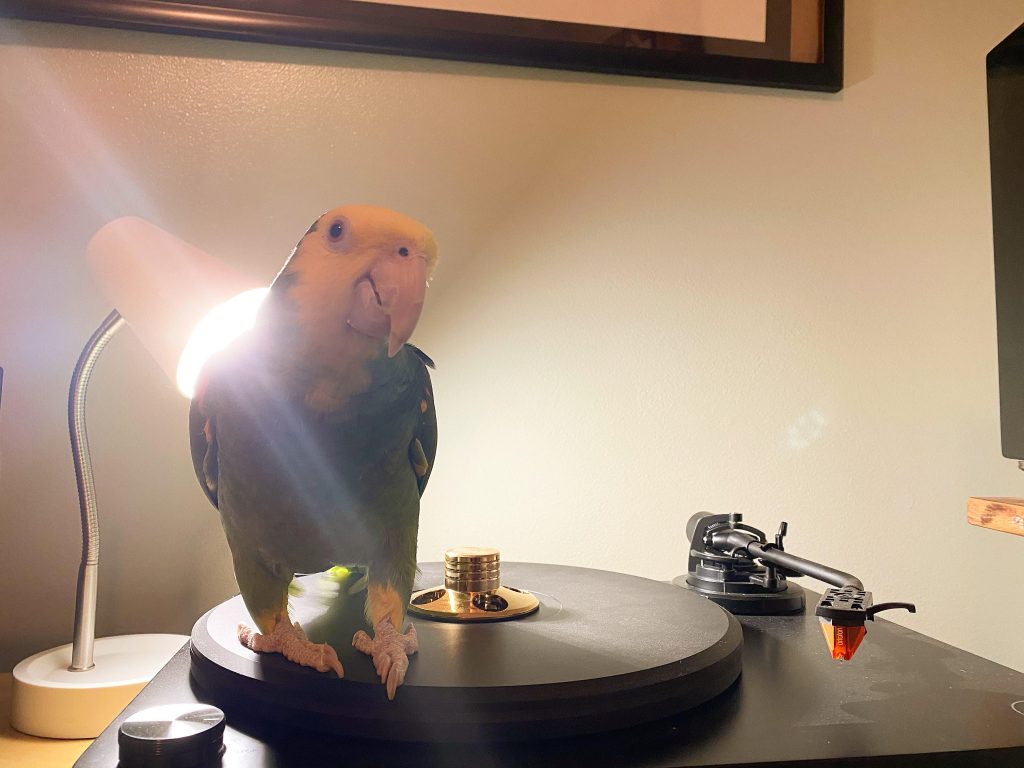
In a blind listening test, the first listener said the following. She preferred the crispness and clarity of the CD, closely by Vinyl and the Cassette sounded muddy and muted. The second listener preferred cassette the most followed closely by vinyl and then CD. To set up the blind test all formats were cued up and played at the same time, using no tonal controls on the Preamp and switched to while the listeners did not know which one they were listing to at any given time. Each Format was played for 30 seconds then switched at random to the other formats playing concurrently.
The blind tests show us that there is a personal preference to sound and that measurement alone is not enough. If the measurement were the only parameter in audio we needed everyone would like the same amp, source, speakers, and so on. Measurements are great to get a baseline, in that if you know the curve you like you can look for things that fit that to help you decide what to audition. At the end of the day unless we are testing something we don’t listen to measurements we listen to music and making that sound the best to each us is the most important aspect.
What of the immeasurables? things that we can not measure easily between each format such as personal enjoyment, the psychological parts, nostalgia. There are people who like things that are objectively worse than other comparable versions in all hobbies, such as 8-bit gaming versus a PlayStation 5 at 4k. But if the fidelity isn’t the draw or the graphics or world size what is it? For many people is the memories or nostalgia of it, perhaps the physicality of cleaning off the cartridge, putting it in the Nintendo, and firing it up. For me personally, this is why I love records. I enjoy picking one out of my collection or digging through the crates at the records shop to find a new one. The whole ritual of vinyl is more engaging than a CD, even though I prefer the sound quality of CD most of the time. I own way more Vinyl Records than CD’s and that will probably always be true. I have no plans to get into cassettes as I do not own more than one now and do own my own cassette deck, the Akai is on loan from my brother.

Storage, decredation and Handling
Regardless of how good any record, cd, or cassette sounded the day it came out if it has degraded to the point of not working it’s sort of irrelevant. CDs were advertised at times as being the permanent recording, it would last forever and didn’t suffer the same handling issues that other formats had. We found out quite quickly that wasn’t the case and just like everything else it had a life span. Tapes and Vinyl records are somewhat delicate in that they are analog formats so physical damage affects sound quality in an immediate way, whereas CD the physical damage has to actually obstruct the laser to create an audible issue, which is actually the opposite of that meaning you’ll hear nothing. Records if stored improperly warp, tapes can tear and come out of the cassette itself, but what of the CD? Well, they suffer from Disc Rot, which is actually a way to describe several different issues that CDs can have. The most common being physical damage on the surface or damage to the reflective material, which can also oxidize over time, delaminate, have UV damage, or react with various chemicals.
When it comes to the actual storage, all of them like the same thing, cool dry spaces. Vinyl should always be stored vertically and CDs like this same orientation as well as cassettes. All of these formats can be damaged by heat and UV, so try not to keep them in your car on the dash to preserve the life span. Tapes also should not be stored under fluorescent light, where that does not seem to be an issue for the other two. When it comes to outright space, cassettes are the easiest ones to store on a shelf as they are the smallest and lightest. Vinyl Records on the other hand are very heavy when you have a lot of them so a very strong shelving unit is needed to keep them tidy.
As far as handling, the cassette is probably the easiest here as well. It is the only one that has a permanent protective shell, whereas CD’S and Vinyl need to be gently pulled from their cases/sleeves and placed in/on their respective players. Vinyl also requires the most pre and post-listing care as it is the only one that is open-air so to speak. This means dusting and the occasional washing of the record to keep the grooves clean and free of dust. The more dust on the surface of the record the more noise you get as well as quicker determination of the grooves and stylus as it drags the dust through them.
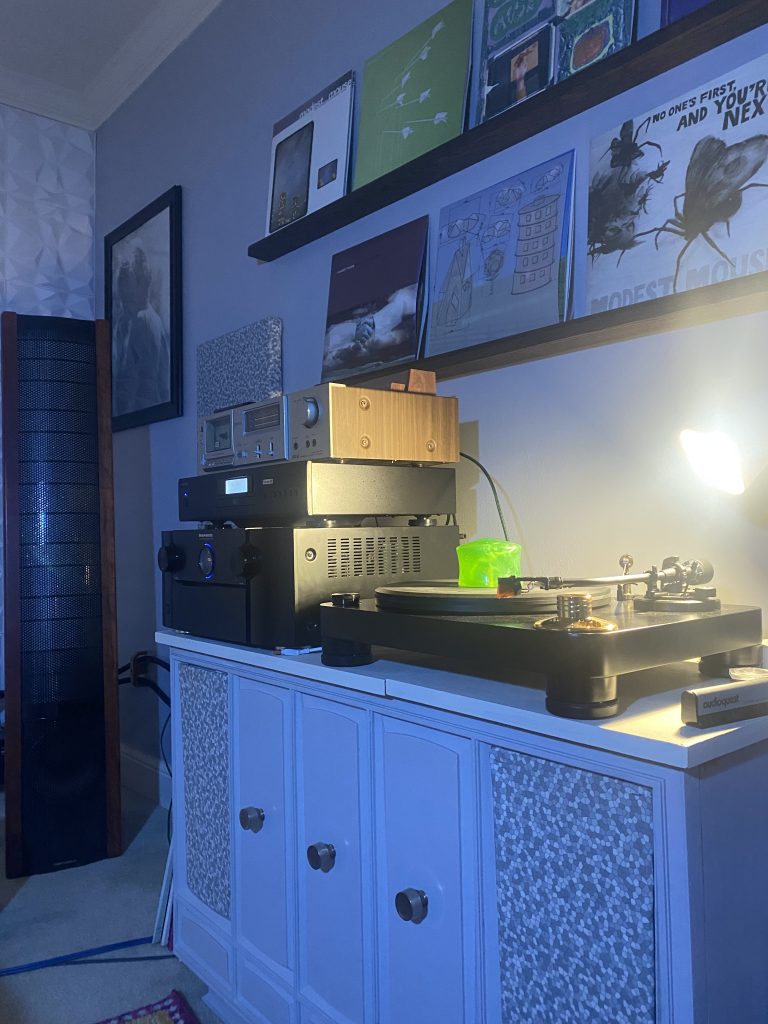
Who Wins?
Well, I wish it was clear cut, but alas with anything in this hobby it is not. If you take everything into consideration, I would say CD is the easiest to listen to, store, and buy. CDs are still plentiful meaning prices are the lowest of any format. Cassettes in good condition are rarer than CDs meaning some of them cost more than their CD counterpart, though not always. Records are usually the priciest, most fickle to store as well as costing more to play than the other two for a comparable quality. Cassettes can be cheap at times depending on what you like to listen to, though new ones cost about the same as the CD and Vinyl release of any new music. Cassette players are pretty cheap these days but I expect that to change with the resurgence of cassettes. Cassette players also tend to be the most likely to need repairs out of the three players, due to their complexity and amount of moving parts. Sound Quality is fairly close on CD and Vinyl, but that completely depends on the pressing, whereas with CD’s if there is no damage every copy will sound as good as others. Cassette falls a bit behind in quality and it deteriorates quicker than CD or Vinyl, especially when not cared for. If I had to choose a winner it is CD for me. I prefer playing a Vinyl Record as mentioned before but that is due more to subjective reasons than objective. Vinyl would be second and cassette third. CDs objectively offer the best listening experience, no surface noise, crystal clear sound, all the data you could want, no RIAA curve, and so on. That said I think vinyl is more fun from a hobby mentality.
Which one wins in your book?


Cover art, sleeve notes & accompanying contextual information are important issues for me when comparing preferred formats. With the occasional exception of CD boxed sets, vinyl is the clear winner here.